News from the Kitchen
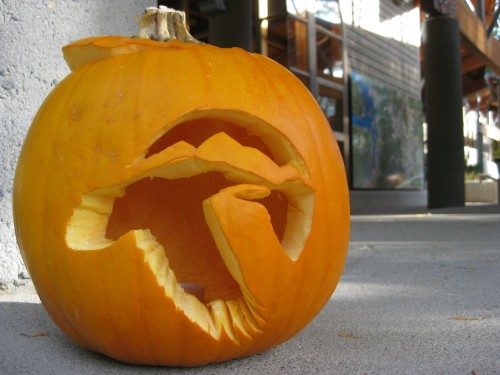 [We are excited to publish the first piece in our Foodshed Series, with monthly updates from the amazing chefs working so hard to provide program participants and staff at the Environmental Learning Center with sustainable, seasonal, and deliciously fresh food. In an age where the production and consumption of food are heavily disconnected, we work hard to preserve those ties by considering how food flows from the farms to our tables and all the processes in between. Purchasing from local farmers allows us to draw connections between their livelihoods and our own while at the same time contributing to our mission to conserve Northwest environments through education. It’s a renewing and rewarding partnership, and one we hope to keep sustaining and growing.]
[We are excited to publish the first piece in our Foodshed Series, with monthly updates from the amazing chefs working so hard to provide program participants and staff at the Environmental Learning Center with sustainable, seasonal, and deliciously fresh food. In an age where the production and consumption of food are heavily disconnected, we work hard to preserve those ties by considering how food flows from the farms to our tables and all the processes in between. Purchasing from local farmers allows us to draw connections between their livelihoods and our own while at the same time contributing to our mission to conserve Northwest environments through education. It’s a renewing and rewarding partnership, and one we hope to keep sustaining and growing.]
Seasonality is a major component of the Foodshed Project at the Environmental Learning Center. By the time the leaves begin to yellow and fall, our refrigerator has already undergone several transformations. Tomatoes, cilantro, peppers and summer squash have made way for apples, hardy greens and, of course, the venerable pumpkin among other winter squash. Making use of our freezer space, we’ve managed to put up a decent supply of sweet corn off the cob as well as organic blueberries from Blue Heron Farm in Rockport and strawberries from Viva Farms in Burlington. It’s a pleasure to be able to preserve these great local products in the shoulder season. With some luck we’ll save some for the dark months as well.
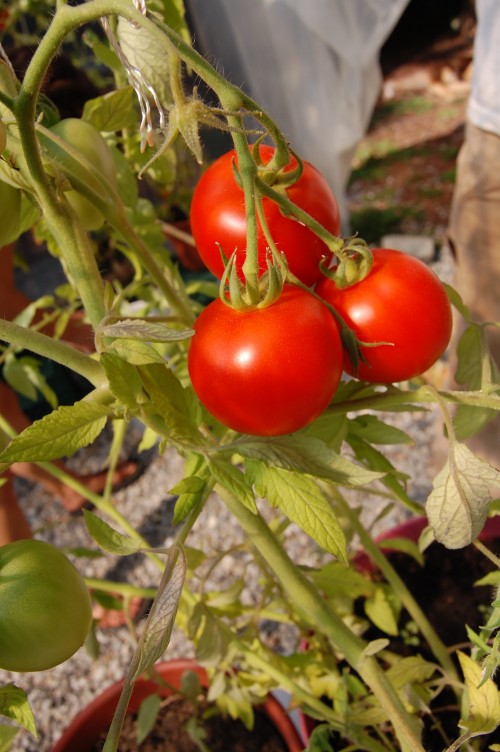 Sights like these are now fond memories of months past.
Sights like these are now fond memories of months past.
Mountain School is now nearing the end of its fall session with two more groups scheduled to arrive, including a first-time visit from Friday Harbor Elementary. We’ll be welcoming them with some of our recent menu items, which have included: pumpkin pancakes and pies, the last dozen pints of organic cherry tomatoes from Blue Heron Farm and a few different varieties of apples from Jones Creek Farm in Sedro Woolley to pack in their lunches. They might also see some spaghetti and meatballs with grass-fed beef from the Nooksack Delta Cattle Co. in Ferndale or roasted chicken from Osprey Hill Farm in Acme. And as always we’ll be providing as much homemade sandwich bread and dinner rolls as we can bake using organic flour from Fairhaven Mills.
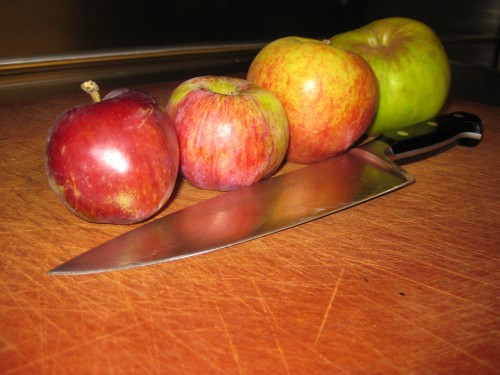 From L to R: Liberty, Red Cortland, Jonagold and a huge green apple (whose name I can’t remember right now) that is great for baking but gives the peeler-corer-slicer a real workout.
From L to R: Liberty, Red Cortland, Jonagold and a huge green apple (whose name I can’t remember right now) that is great for baking but gives the peeler-corer-slicer a real workout.
The change in seasons is a great time for us to evaluate how the Foodshed Project is developing. And it’s going well. We accommodated an increase in programming including the Skagit Boat Tour lunches this past summer season that featured fresh-baked bread, homemade soups, various entrees and coleslaw made with local cabbage. We also grew the percentage of organic products in our pantry, including gluten-free oats, all-purpose and bread flours, canola oil, evaporated cane juice, black, red and pinto beans, wild-rice blends, flaxseed and honey, among others.
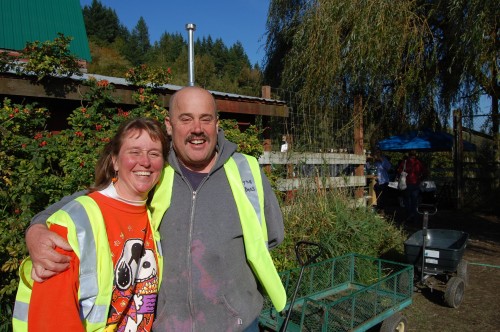 Les and Talia Price of Jones Creek Farms greet visitors at their recent Fall Farm Festival.
Les and Talia Price of Jones Creek Farms greet visitors at their recent Fall Farm Festival.
At the Environmental Learning Center kitchen we strongly believe that food is a pivotal element of environmental education. Food and the landscape are inescapably connected. We take pride in trying to offer up the best we can and are continually humbled in our culinary pursuits. We’d also like, in the waning of the harvest season, to pay respects to the local farmers and ranchers as well as give thanks for the bounty that the Skagit offers us. Food is life, and life is good.
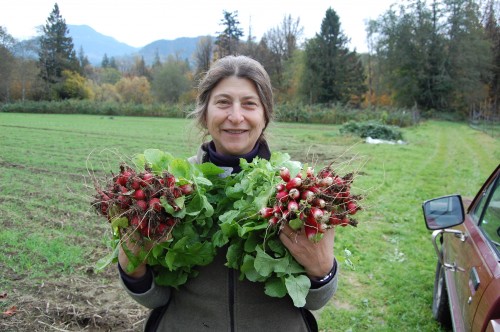 Anne Schwartz of Blue Heron Farm holds up Cherry Belle and French Breakfast radishes fresh from the soil. Behind her is a field planted in fall cover.
Anne Schwartz of Blue Heron Farm holds up Cherry Belle and French Breakfast radishes fresh from the soil. Behind her is a field planted in fall cover.
Cooking tip of the day: “If you want good bread, plan ahead.”
Leading photo a rendition of the NCI logo by Alex Patia of Graduate Cohort 11. All photos courtesy the author.

